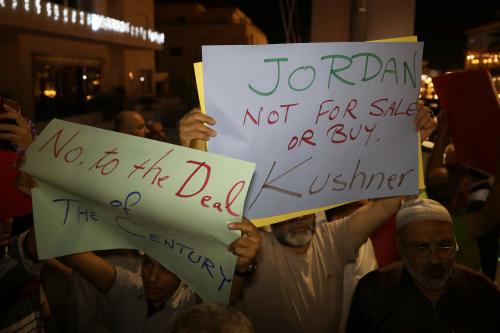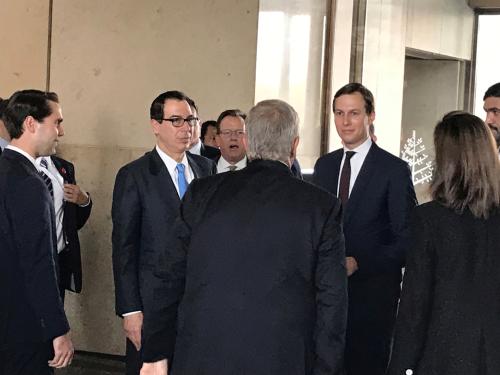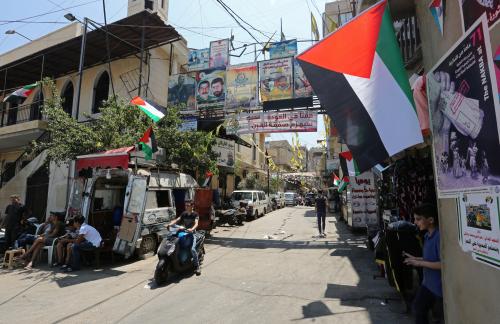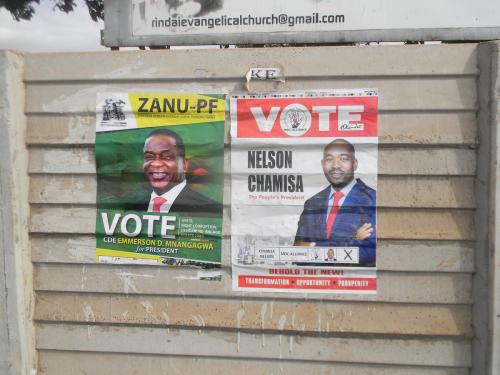On June 25 and 26, the White House convened a workshop in Manama, Bahrain to discuss the economic component of its long-awaited Middle East peace plan. Brookings experts have weighed in with analysis of the economic proposals and likely outcomes from the Bahrain meeting.
FLAWS IN THE TRUMP ADMINISTRATION’S APPROACH
White House Senior Advisor Jared Kushner opened the proceedings in Manama on Tuesday by stating that “today is not about political issues,” adding: “Despite what those who let you down in the past tell you, the president and America have not given up on you.”
“’Those who let you down in the past,’” Senior Fellow Tamara Cofman Wittes notes, “means the Palestinian leadership who have not delivered on promises of statehood and sovereignty,” adding that Trump administration officials “are still trying to press this idea that they can go over the heads of the Palestinian leadership and speak directly to the Palestinian people.”
For Wittes, this reflects a flawed assumption that “the main problem is a Palestinian leadership that refuses to engage, and that the White House should be able to come up with something so attractive to the Palestinian public that they will demand that their leaders engage on it.”
Nonresident Senior Fellow Shibley Telhami describes the foundation of the Trump administration’s approach as unsound. He argues that, “while ignoring prior peace agreements, U.N. resolutions, and international law, Trump’s approach is anchored on three flawed principles: ‘realities’ on the ground as they are, appeal to ethnic/religious justifications of Israeli control of occupied territories, and economic incentives to appease Palestinian political aspirations.”
Hady Amr, Visiting Fellow and former U.S. Deputy Special Envoy for Israeli-Palestinian Negotiations at the State Department, argues that the White House’s choice to release an economic vision before a political plan is mistaken. “Putting the peace-plan cart (economics) before the horse (freedom and sovereignty) is a fatal flaw for the Trump/Kushner approach,” he writes.
On Twitter, Nonresident Fellow Khaled Elgindy argues that, “the political dimension of the Kushner plan is based on erasing and/or circumventing the political dimension of the conflict—including the [Palestinians’] political identity, their political aspirations, and their political leadership.”
THE ECONOMIC PLAN
The White House released its plan with a website, a narrative, and a list of programs and projects. Titled “Peace to Prosperity,” the proposal declares its “potential to facilitate more than $50 billion in new investment over ten years” in the Palestinian Territories, Egypt, Jordan, and Lebanon.
Omar Rahman, visiting fellow at the Brookings Doha Center, writes: “Over the past 25 years, billions of dollars have been poured into the occupied territories in development and humanitarian aid, but the economy is actually moving in the wrong direction. That is because the occupation does not simply restrict Palestinian economic development, it actively subverts it and redirects growth to the Israeli economy.”
He adds that “glaringly absent from the document is any mention of a Palestinian national entity. The word ‘state’ only appears in the formulations ‘neighboring states’ and ‘state-of-the-art.’ Even the word ‘national’ only shows up once, to describe Egypt, Lebanon, and Jordan.”
This effort to decouple the economics of Middle East peace from politics “has only fed Palestinian suspicions that the Trump administration has ill-intentions regarding their political future,” he continues.
Telhami argues that political aspirations matter more than economic incentives:
In the hopeful days of the 1990s, a great deal was invested in such ambitious projects as Bethlehem 2000. When political negotiations collapsed, violence erupted, and investments went up in flames. To assume that the promise of economic improvement would outweigh ordinary human aspirations of a people who have painfully struggled for decades is to miss the nature of the human condition.
Amr writes that, “Had the Trump team first built a strong rapport with the Palestinian people and leadership, worked in partnership with them to identify their needs, and then discussed these ideas alongside a fair agenda for genuine freedom for the Palestinian people, things could have been entirely different.”
Instead, “Trump and Kushner have chosen to release this plan after spending 18 months deeply offending the Palestinian people,” Amr notes, referencing U.S. decisions such as the cutting of assistance to the West Bank and Gaza, the cutting of assistance to hundreds of thousands of refugee families, the closing of the Palestinian political office in Washington, and the closing of the 175-year-old consulate to the Palestinian people in Jerusalem and its subsequent merging with the U.S. embassy to Israel.
Writing on Twitter, Wittes adds that “perusing the vision and programmatic elements offered [in the plan], one can’t help but wonder at the logic of [the Trump administration] in cutting off dozens of U.S. assistance programs that were designed to advance precisely these goals.”
AN OPPORTUNITY?
Rahman argues that the economic plan, although flawed, creates an opportunity for the Palestinians:
Instead of rejecting it out of hand, the Palestinian leadership should hammer the message in the media that they would love to accept this economic vision in the context of having full political rights, either in a state of their own or within a secular, binational state. But, like citizens in America and Israel, Palestinians want the right to vote and elect the leaders that govern their lives. They refuse to live as permanent subjects under the hegemony of a foreign power. And no amount of development assistance can substitute for that right.
Wittes sees both opportunity and risk in the gathering of Arabs and Israelis, among others, in Manama. “Although there are many, many reasons to be skeptical about the substance of this White House effort, the sequencing of it, [and] the political context that the White House itself has created that has made its work so much harder, it is still a moment when Arabs and Israelis can take a step back from the ugly reality of their day-to-day relationship and maybe catch a glimpse of something different, something better,” she says.
“But frankly I worry that given how poorly the Trump administration has managed the process so far, this glimpse of hope might only end up deepening cynicism when everyone goes back home,” she concludes.
The Brookings Institution is committed to quality, independence, and impact.
We are supported by a diverse array of funders. In line with our values and policies, each Brookings publication represents the sole views of its author(s).








Commentary
Brookings experts assess White House Middle East economic plan
June 26, 2019